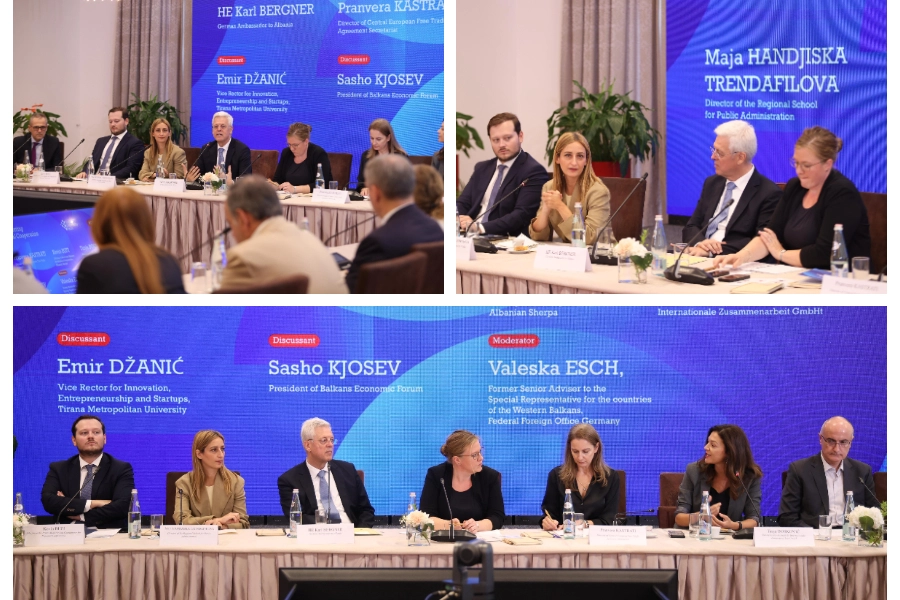
ReSPA regularly powers TCF: Director Handjiska Trendafilova steered the “Implementing Regional Cooperation” debate
16–17 September 2025, Tirana, Albania
ReSPA traditionally enriched the Tirana Connectivity Forum (TCF2025), which brought together senior policymakers, EU officials, diplomats, business leaders and think-tankers to focus on security, competitiveness and accelerated EU accession of the SEE6.
The Forum opened with keynote addresses by Belinda Balluku, Deputy Prime Minister of Albania, and Meglena Kuneva, former EU Commissioner and Deputy Prime Minister of Bulgaria, setting a tone for the region’s European convergence. Panel “South East Europe 6 as a Security Provider” featured Pirro Vengu (Minister of Defence of Albania), Atanas Zapryanov (Minister of Defence of Bulgaria), and Zoran Dimitrovski (Deputy Minister of Foreign Affairs of North Macedonia), with discussants Zsolt Bunford (Prime Minister's Special Envoy for the Western Balkans, Hungary) and Ivica Bocevski (former Deputy Prime Minister of North Macedonia).
Day Two continued with keynotes by HE Elisa Spiropali (Minister-designate for Europe and Foreign Affairs), Amb. Michael Reiffenstuel (German Federal Foreign Office), Valentina Superti (Director Western Balkans, DG ENEST), and Amer Kapetanović (Secretary General, RCC). Roundtable 1 – “Accelerating SEE6 readiness for EU membership” convened Judith Rózsa (SG REFORM), Eridana Çano (Reform & Growth Facility Coordinator), and Biljana Papović (State Secretary, Ministry of European Affairs of Montenegro), with conclusions by Tanja Miščević.
In the session “Roundtable 2: Implementing Regional Cooperation,” Director Handjiska Trendafilova steered a discussion with HE Karl Bergner (German Ambassador to Albania), Pranvera Kastrati (Director of CEFTA Secretariat), Kevin Bufi (Advisor to the Albanian Prime Minister), and Tanja Bošković (Project Leader RegioTrade, GIZ). The debate also drew on inputs from discussants Emir Džanić (Tirana Metropolitan University) and Sasho Kjosev (Balkans Economic Forum), focusing on how to turn frameworks into functioning cross-border solutions in trade, skills and innovation.
Building on the discussion, Director Handjiska Trendafilova delivered the key takeaways, emphasising that regional cooperation is the backbone of Western Balkans progress; that the private sector and academia are essential partners; and that the Growth Plan for the Western Balkans and the Common Regional Market are mutually reinforcing—the former deepening ties with the EU Single Market while the latter strengthens the region internally. She underlined that implementation requires political will, institutional capacity and coordination, and highlighted ReSPA’s role in equipping public administrations with the skills and know-how to turn commitments into results for citizens and businesses. “Capacities and institutions matter and agreements and frameworks as strong as the institutions that deliver. ReSPA helps build that delivery and administrative capability muscle—so agreements become better services, faster procedures, and real opportunities for citizens and businesses.” said Handjiska Trendafilova, while wrapping up the panel.
By gathering decision-makers and practitioners around the security–competitiveness–EU accession nexus, TCF2025 reinforced its role as a practical platform for aligning policies with delivery. ReSPA’s steady contribution—culminating in Director Handjiska Trendafilova’s steering of the regional-cooperation debate and her conclusions—underscored the message of trust, continuity and institutional capacity as the foundation for faster EU alignment and tangible benefits for citizens.



